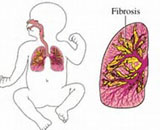
Bronchopulmonary dysplasia (BPD; formerly chronic lung disease of infancy) is a chronic lung disorder of infants and children first described in 1967. It is more common in infants with low birth weight and those who receive prolonged mechanical ventilation to treat respiratory distress syndrome (RDS). It results in significant morbidity and mortality. The definition of BPD has continued to evolve since then primarily due to changes in the population, such as more survivors at earlier gestational ages, and improved neonatal management including surfactant, antenatal glucocorticoid therapy, and less aggressive mechanical ventilation.
Organism species: Mus musculus (Mouse)
| CATALOG NO. | PRODUCT NAME | APPLICATIONS | |
| Models | n/a | Model for Bronchopulmonary Dysplasia (BPD) | Disease Model Customized Service Offer |
| Tissues | n/a | Tissue of Bronchopulmonary Dysplasia (BPD) (If Necessary) | Tissue Customized Service Offer |
| Serums | n/a | Serums of Bronchopulmonary Dysplasia (BPD) (If Necessary) | Serums Customized Service Offer |
Organism species: Rattus norvegicus (Rat)
| CATALOG NO. | PRODUCT NAME | APPLICATIONS | |
| Models | DSI729Ra01 | Rat Model for Bronchopulmonary Dysplasia (BPD) | Disease Model |
| Tissues | n/a | Tissue of Bronchopulmonary Dysplasia (BPD) (If Necessary) | Tissue Customized Service Offer |
| Serums | n/a | Serums of Bronchopulmonary Dysplasia (BPD) (If Necessary) | Serums Customized Service Offer |
